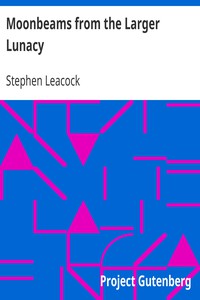Moonbeams from the Larger Lunacy, Stephen Leacock [best mobile ebook reader TXT] 📗

- Author: Stephen Leacock
Book online «Moonbeams from the Larger Lunacy, Stephen Leacock [best mobile ebook reader TXT] 📗». Author Stephen Leacock
“Nay, nay, Master Nick,” said Brenton, firmly, “that will I never allow. Let us make it to ourselves a maxim that all that shall be said in this news sheet, or ‘news paper,’ as my conceit would fain call it, for be it not made of paper (here a merry laugh of the apprentices greeted the quaint fancy of the Master), shall be of ascertained verity and fact indisputable. Should the Grand Turk make war and should the rumour of it come to these isles, then will we say ‘The Turk maketh war,’ and should the Turk be at peace, then we will say ‘The Turk it doth appear is now at peace.’ And should no news come, then shall we say ‘In good sooth we know not whether the Turk destroyeth the Bulgars or whether he doth not, for while some hold that he harasseth them sorely, others have it that he harasseth them not, whereby we are sore put to it to know whether there be war or peace, nor do we desire to vex the patience of those who read by any further discourse on the matter, other than to say that we ourselves are in doubt what be and what be not truth, nor will we any further speak of it other than this.’”
Those about Caxton listened with awe to this speech. They did not,—they could not know,—that this was the birth of the Leading Article, but there was something in the strangely fascinating way in which their chief enlarged upon his own ignorance that foreshowed to the meanest intelligence the possibilities of the future.
Nicholas shook his head.
“‘Tis a poor plan, Master Brenton,” he said, “the folk wish news, give them the news. The more thou givest them, the better pleased they are and thus doth the news sheet move from hand to hand till it may be said (if I too may coin a phrase) to increase vastly its ‘circulation’—”
“In sooth,” said Master Brenton, looking at Nicholas with a quiet expression that was not exempt from a certain slyness, “there I do hold thou art in the wrong, even as a matter of craft or policie. For it seems to me that if our paper speaketh first this and then that but hath no fixed certainty of truth, sooner or later will all its talk seem vain, and no man will heed it. But if it speak always the truth, then sooner or later shall all come to believe it and say of any happening, ‘It standeth written in the paper, therefore it is so.’ And here I charge you all that have any part in this new venture,” continued Master Brenton, looking about the room at the listening faces and speaking with great seriousness, “let us lay it to our hearts that our maxim shall be truth and truth alone. Let no man set his hand to aught that shall go upon our presses save only that which is assured truth. In this way shall our venture ever be pleasing to the Most High, and I do verily believe,”—and here Caxton’s voice sank lower as if he were thinking aloud,—“in the long run, it will be mighty good for our circulation.”
The speaker paused. Then turning to the broad sheet before him, he began to scan its columns with his eye. The others stood watching him as he read.
“What is this, Master Edward,” he queried presently, “here I see in this first induct, or column, as one names it, the word King fairly and truly spelled. Lower down it standeth Kyng, and yet further in the second induct Kynge, and in the last induct where there is talk of His Majesty’s marvelous skill in the French game of palm or tennis, lo the word stands Quhyngge! How sayeth thou?”
“Wouldst have it written always in but one and the same way?” asked the printer in astonishment.
“Aye, truly,” said Caxton.
“With never any choice, or variation to suit the fancy of him who reads so that he who likes it written King may see it so, and yet also he who would prefer it written in a freer style, or Quhyngge, may also find it so and thus both be pleased.”
“That will I never have!” said Master Brenton firmly, “dost not remember, friend, the old tale in the fabula of Aesopus of him who would please all men. Here will I make another maxim for our newspaper. All men we cannot please, for in pleasing one belike we run counter to another. Let us set our hand to write always without fear. Let us seek favour with none. Always in our news sheet we will seek to speak dutifully and with all reverence of the King his Majesty: let us also speak with all respect and commendation of His Majesty’s great prelates and nobles, for are they not the exalted of the land? Also I would have it that we say nothing harsh against our wealthy merchants and burgesses, for hath not the Lord prospered them in their substances. Yea, friends, let us speak ever well of the King, the clergy, the nobility and of all persons of wealth and substantial holdings. But beyond this”—here Brenton Coxton’s eye flashed,—“let us speak with utter fearlessness of all men. So shall we be, if I may borrow a mighty good word from Tacitus his Annals, of a complete independence, hanging on to no man. In fact our venture shall be an independent newspaper.”
The listeners felt an instinctive awe at the words, and again a strange prescience of the future made itself felt in every mind. Here for the first time in history was being laid down that fine, fearless creed that has made the independent press what it is.
Meantime Caxton continued to glance his eye over the news sheet, murmuring his comments on what he saw,—“Ah! vastly fine, Master Nicholas,—this of the sailing of His Majesty’s ships for Spain,—and this, too, of the Doge of Venice, his death, ‘tis brave reading and maketh a fair discourse. Here also this likes me, ‘tis shrewdly devised,” and here he placed his finger on a particular spot on the news sheet,—“here in speaking of the strange mishap of my Lord Arundel, thou useth a great S for strange, and setteth it in a line all by itself whereby the mind of him that reads is suddenly awakened, alarmed as it were by a bell in the night. ‘Tis good. ‘Tis well. But mark you, friend Nicholas, try it not too often, nor use your great letters too easily. In the case of my Lord Arundel, it is seemly, but for a mishap to a lesser person, let it stand in a more modest fashion.”
There was a pause. Then suddenly Caxton looked up again.
“What manner of tale is this! What strange thing is here! In faith, Master Nicholas, whence hast thou so marvelous a thing! The whole world must know of it. Harken ye all to this!
“‘Let all men that be troubled of aches, spavins, rheums, boils, maladies of the spleen or humours of the blood, come forthwith to the sign of the Red Lantern in East Cheap. There shall they find one that hath a marvelous remedy for all such ailments, brought with great dangers and perils of the journey from a far distant land. This wonderous balm shall straightway make the sick to be well and the lame to walk. Rubbed on the eye it restoreth sight and applied to the ear it reviveth the hearing. Tis the sole invention of Doctor Gustavus Friedman, sometime of Gottingen and brought by him hitherwards out





Comments (0)